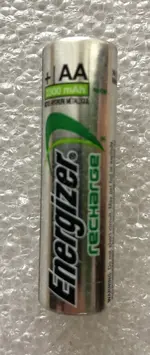You have me wondering what batteries you have been using with your AT Pro? I also wonder what you consider to be "way too many batteries" related to how much detecting time. A long-period of detecting day-after-day, or a combination of days when you only detect for ±2 hours? Do you use headphones which can help reduce a certain amount of the battery drain?
I've been at this great sport for well over half-a-century, and when I was younger I put in many long search periods. My days off I was frequently spending full days working Relic Hunting sites, or if limited to Coin Hunting urban locations I was still doing 8 to 10 hours a day. Up until about two decades ago I was frequently testing all sorts of brands of Regular, Heavy Duty and Alkaline batteries, and during the mid-to-late '80s I found a few brands of Heavy Duty batteries that lasted quite long, and cost-wise were more affordable than many Alkaline batteries.
Most of the rechargeable batteries around were NiCad and quality Alkaline batteries way out-lasted the NiCad and were more affordable, and easily available. By the latter '90s we saw more metal detectors trending to Tone ID and Target ID and other functions like backlighted displays that would draw more battery power. More digital designed detectors, but that didn't seem to lengthen battery life. Instead it's been more the opposite.
If I only had one detector, and that was all that used AA batteries, I might just power it up with the Eneloop rechargeable batteries I have on-hand, but will likely sell them. I got them with a detector purchase and used them for maybe 6 hours to compare the drain-rate against some Alkaline batteries I was comparing, then put them away with the charger.
In my Regular-Use Detector Outfit I have two Tesoro's and a Teknetics Omega 8000 that require 1 9-Volt battery each. But I need a supply of AA Alkaline batteries on-hand for most of my detectors: 2-each for my 2 Fisher F44's, 4-each for my 2 Nokta FORS CoRe and 2 FORS Relic and a Teknetics T2+, and 8 for my White's MXT All-Pro. In addition, I have flashlights that are AA powered as well: 3-each for the one at my desk, 4-each for one in my 'outdoor' closet and one in one vehicle, 9-each for the one in my critter-hunting gear, another in my bedroom and a 3rd in my living room, and 9-each in my emergency-use flashlight. Also, two new lights in my Emergency Supply Tote that take 4-each and 6-each.
I also need AA batteries for my Blood Pressure monitors, emergency radio and probably something else that doesn't come to mind. Oh, 3-each for the two lanterns, one that's kept in my first aid tote and another that's in my TV room. I also have two flashlights that are rechargeable with Lithium batteries, three from Duracell that require 'C' cells, and I need AAA alkaline batteries for my GMRS radios, 3 smaller flashlights I have located around the house and 7 or 8 brand new ones in my Emergency Supply Tote.
But we're only talking about AA Alkaline batteries to power our detectors, and other gear, and in my Emergency Supply Tote I have another container, my Battery Tote. In there I have other batteries, but my biggest supply is 745, at least weeks count, of AA Alkaline Batteries. I don't need Rechargeable batteries with all my power-required sources. Besides, my detectors provide me with very good run-time with decent Alkaline Batteries, and they are easily available to keep the operating cost low.
My favorite AA alkaline batteries are Duracell, but the same maker also produces the Kirkland house brand for Costco at a much lower retail price. A 3rd battery that is affordable and works well for me are the ones I buy at Albertson's grocery. A 60-pack costs a little under $11. At $10.95 a pack that amounts to 18¼¢ per battery, so to fill an 8-AA Alkaline battery system it only comes to $1.46. I usually get ± 40 hours of operating time, but let's say your detector only gave you 20 hours of service. That would end up costing less than 7½¢ per hour, and if that's not cheap enough to afford a decent Alkaline battery at an affordable price, another hobby might be better.
And that's figuring it with an 8-AA powered detector only providing 20 hours of service. I only have one of those models right now. I have 5 workhorse detectors that only require 4-AA's each, and all of them provide well over 20 hours of run-time each, easily, so my get-serious hunting is costing me no more than 3¾¢ per-hour.
And some of those 745 brand new packs of AA Alkaline batteries might not work as long as a Duracell or Kirkland or other top maker, but they have also met the run-times I mentioned and I buy them on sale in 36 or 48 packs making each battery cost 10½¢ to under 14¢ each.
Sorry to ramble, but I use a lot of AA batteries so I am cost efficient, keep an ample supply, and use brands that hold up well in my detectors and other devices. Either your Garrett AT Pro is a power-hungry device, or you are not using a decent Alkaline battery if you're having issues with short battery life. So, either get a different detector, change to a better Alkaline battery, or go with a Rechargeable battery. But keep in mind that if your unit is going through good Alkalines quickly, then you're going to be removing and recharging the other batteries frequently.
Therefore, my suggestions if you want to go rechargeable are #1.. the RnB batteries or #2.. the individual Eneloop.
Monte





